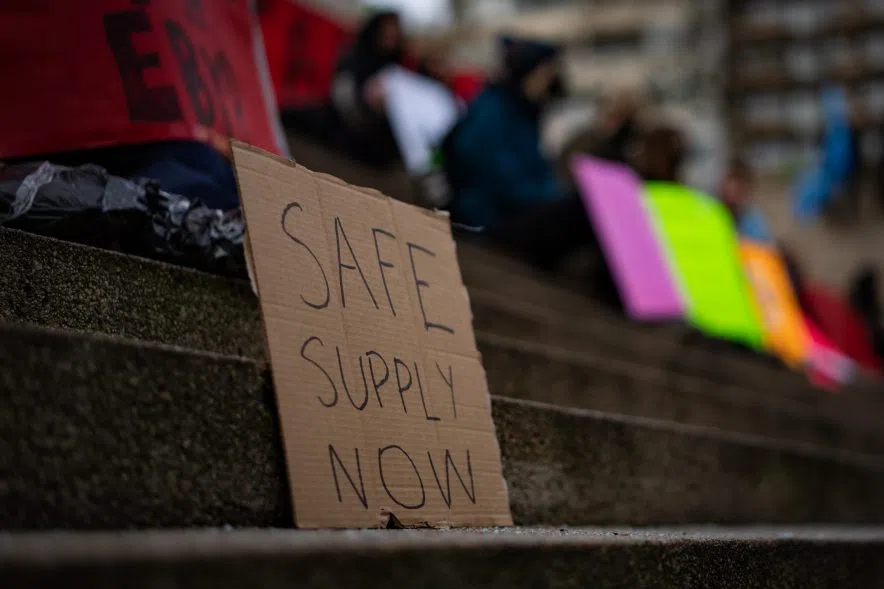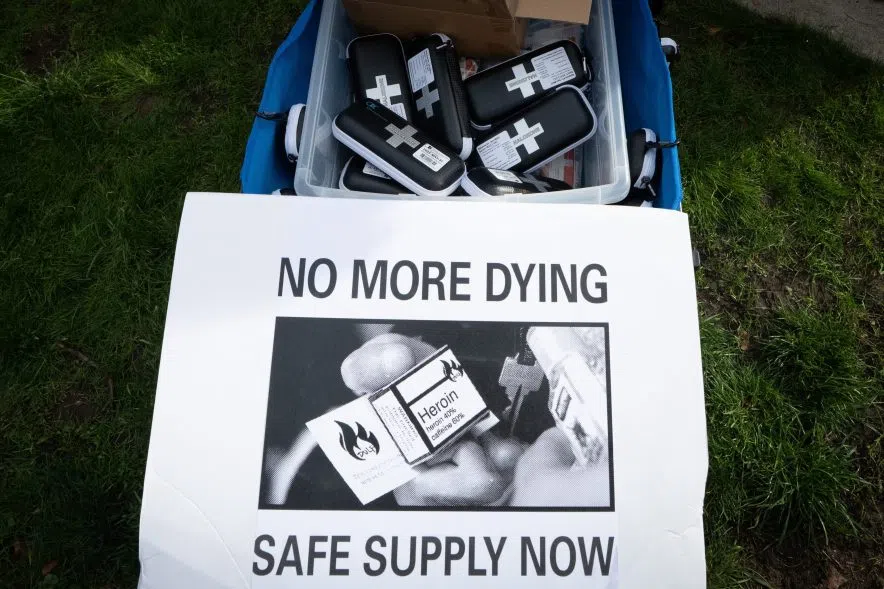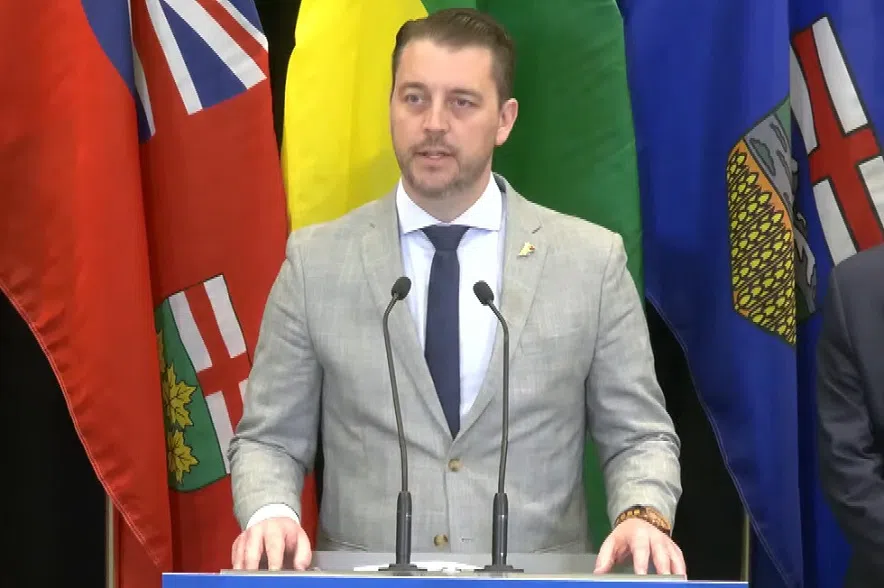Saskatchewan’s government appears firm in its position to steer clear of implementing a safe drug supply or decriminalization as members watch B.C.’s drug policies unfold.
“I know the members opposite want to desperately convince the communities across Saskatchewan that there is somehow some safe use of an illicit drug. They want to flood our streets with needles and dirty crack pipes, Mr. Speaker, but that is not the strategy of this government,” said Saskatchewan Mental Health and Addictions Minister Tim McLeod in a recent Question Period.
Provincial ministers have also suggested that policies of other provinces, like safe supply and decriminalization in B.C., negatively impact Saskatchewan.
“That’s why we have to take the response we have to counter some of that because it’s truly toxic, and there are impacts across the country when one jurisdiction takes a certain approach,” said Justice Minister Bronwyn Eyre to the SUMA convention in response to a question about drug enforcement.
The NDP would decriminalize drugs in SK.
We will not.
We will focus on treatment and recovery.
Mental Health and Addictions Minister Tim McLeod explains the difference between our approach and the failed approach of the B.C. NDP government. pic.twitter.com/Sej1Zb2iRy
— Scott Moe (@PremierScottMoe) May 1, 2024
Safe supply
Safe supply is a program which allows clients with a prescription to access a range of clean, safer drugs from an authorized supplier, meant to reduce the risks of overdose and death.
Last year, B.C. got an exemption from Health Canada for a three-year pilot project to decriminalize the use of hard drugs, which currently allows for the prescription of opioids.
Macleod said providing a safe supply of drugs adds more drugs to the street, pointing to recent headlines in B.C. that quote RCMP saying safe supply drugs have shown up in illicit drug busts.
“Anywhere drugs are being added into the community, it’s a reasonable conclusion that you’re adding to the problem and you’re not adding to the solution,” he said.
The minister said the drug trade doesn’t stop at provincial borders.
A wagon of Naloxone kits is seen during a rally advocating for the continuation of safe supply drugs in in Vancouver, on Friday, Nov. 3, 2023. THE CANADIAN PRESS/Ethan Cairns
Richard Lowen is Chief of the Estevan Police Service and president of the Saskatchewan Association of Chiefs of Police. He couldn’t confirm whether safe supply drugs from B.C. are showing up in Saskatchewan, but he did say that changes in other provinces can have an impact here.
“That can happen in so many different ways, whether that’s just supplies or transportation or dealers travelling across different provinces,” said Lowen.
However, he said there are no statistics to confirm this suspicion.
Nicholas Boyce, policy director with Canadian Drug Policy Coalition based out of Simon Fraser University in B.C., has a more definitive answer.
He said a standing committee on health in B.C. recently heard police say safe supply drugs weren’t showing up in Alberta, so Boyce said they wouldn’t be showing up a province further away in Saskatchewan.
The safe supply program in B.C. has been criticized for not having a marked effect on overdose and death rates, but Boyce suggests the problems with the illicit drug market are getting worse, and the number of people able to access safe supply is narrower than it needs to be to have a bigger effect.
Decriminalization
Members of the Saskatchewan government have also talked about decriminalization as a concern and, recently, as a failed policy given the B.C. government has asked for an amendment to no longer allow drug use in public.
“Decriminalization of illicit drugs condones and normalizes the use of illicit drugs, and that’s not something that we want to see here in Saskatchewan, or something that we support,” explained McLeod.
He said the message government sends to its communities is an important one.
“The conversation around decriminalization of illicit drugs is giving that false impression that there’s something safe about illicit drugs, and that’s simply not the case,” said the minister.
Tim McLeod joins mental health and addictions ministers from Ontario and Alberta on Thursday to announce a new partnership on their shared move to a “recovery-oriented system of care.”
(Government of Alberta livestream)
Boyce said drug decriminalization isn’t about normalizing drug use — it’s about removing stigma.
He said drug use is already normal, many people do it, and that they need to be able to talk openly and honestly about it without fear of getting in trouble with the law or being stigmatized by their doctors or families.
“The criminalization of (drug use) feeds a stigma, feeds a fear, it reduced access to services, it reduces access to supports,” explained Boyce.
He said decriminalization is a baby step toward treating drug use as a health and social issue and not a criminal one.
Boyce said the decriminalization pilot project in B.C. is trying to undo more than 100 years of prohibition and criminalization.
“With any pilot, you’re going to learn lessons, with any pilot you’re going to have to adjust along the way, but to say that this has failed is absolute nonsense. What has failed is government’s inability to enact things that are going to help,” said Boyce.
This back step from the B.C. government on public use has prompted some in other governments, like Saskatchewan’s, to point to it and say the project only causes more problems, but Boyce said that’s just creating a scapegoat.
“It’s deflecting from the real issues and the real strategies that government could be implementing that would have far greater impacts in terms of reducing deaths and making everyone healthier and safer,” he said.
Needs in Saskatchewan
Despite the perceived problems in B.C., activists in Saskatchewan continue to advocate for safe supply and decriminalization here.
Kayla DeMong, executive director of Prairie Harm Reduction in Saskatoon, says research has shown benefits to those who use safe supply programs.
“If we were able to distribute substances that were non-toxic, there is more stability and more security that we could offer people,” she said.
She said the unfortunate thing in Saskatchewan is that decisions on these programs are based on opinions and ideology.
“The government, these opinions that they’re having, is that people (who) don’t choose recovery, don’t deserve to live.”
She pointed to the province’s recent decision to stop funding clean supplies for drug users.
At the same time, the Government of Saskatchewan also signalled a shift to a recovery-based model of care, which focuses more on detox and treatment for addictions.
However, Boyce said that can’t be the only work the province is doing.
“No one’s arguing against better, more accessible treatment, but it can’t come as the only focus, you need that alongside harm reduction supports and things like safe supply, consumption sites, and decriminalization,” he explained.
In the realm of destigmatization, DeMong said the staff at Prairie Harm Reduction assists many clients in getting treatment.
“We’re making consistent referrals into treatment programs because people finally feel supported, they feel like they’re not being judged.”
Saskatchewan’s Chiefs of Police aren’t discounting decriminalization.
When asked if the group was against the idea, Chief Lowen said they believe decriminalization could be a piece of the puzzle, along with treatment and health care.
“We recognize that it’s a health issue and it’s not just a policing issue and it has to be treated as such,” said Lowen.
He believes decriminalization alone isn’t the answer if there aren’t other services to go with it.









